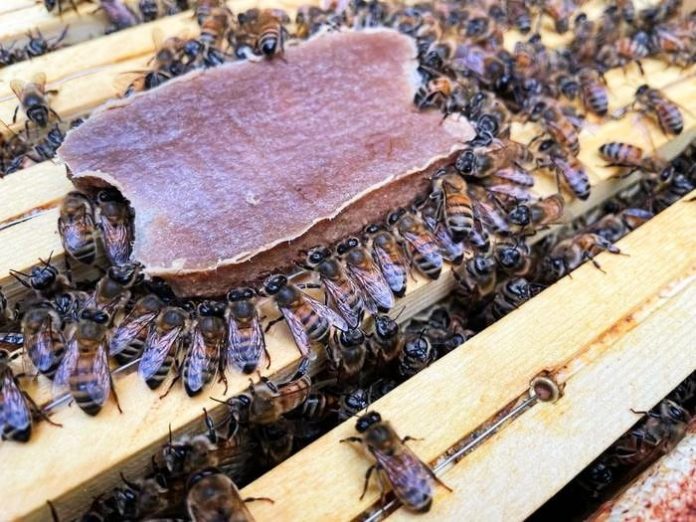Scientists have developed a special food that could revolutionize honey bee conservation – it resembles protein bars that provide energy to humans!
A team from Washington State University and Belgium’s APIX Biosciences have created a complete artificial diet that can sustain bee colonies even when they lack access to flower pollen. This breakthrough has the potential to combat the threat of colony collapse, which endangers wild bee populations and the crops they pollinate.
The new food takes the form of a protein bar and contains all the essential nutrients for bee survival. Beekeepers can introduce these “power bars” directly into honey bee colonies, where young worker bees process and distribute the nutrients to larvae and adult bees.
“Changes in land use, urban expansion, and extreme weather negatively impact nutrition for honey bees and other pollinators,” explained Brandon Hopkins, Professor of Pollinator Ecology at WSU. “Honey bees require dietary variety to survive, but struggle to find a continuous supply of pollen.”
Prior to this development, honey bees were the only livestock unable to thrive on artificial feed alone. Most animals raised by humans, such as chickens and cows, can thrive on carefully designed diets, but bees traditionally needed natural pollen. This breakthrough changes that notion completely.
The research team discovered the importance of a molecule called isofucosterol, naturally found in pollen, for bee health. When this nutrient was omitted from test diets, bee colonies exhibited reduced larval production, adult paralysis, and eventual collapse.
To demonstrate the efficacy of their food in real-world scenarios, scientists tested it with honey bee colonies placed in blueberry and sunflower fields known for low-quality pollen. The results were impressive – colonies provided with the new food flourished, while those without it struggled or perished.
“Some beekeepers have stopped pollinating blueberries due to colony struggles or deaths,” noted Hopkins. “Blueberry pollen lacks nutrition for honey bees, but with this supplementary food source, beekeepers may resume pollination knowing their bees are more likely to survive.”
This development comes at a crucial time, as bee populations globally face significant challenges such as habitat loss, pesticide exposure, and climate change. When bees lack diverse, nutritious pollen sources, their immune systems weaken, making them susceptible to diseases and parasites.
The research team aims to make their bee supplement commercially available by mid-2026. In the meantime, they are collaborating with beekeepers across the USA to incorporate this new tool into standard beekeeping practices effectively.
For young animal enthusiasts concerned about bee conservation, this advancement offers hope. By ensuring honey bees receive adequate nutrition, we may help reverse the concerning trend of colony collapse, safeguarding these crucial pollinators and the food systems they support.
Remember – approximately one-third of our food supply relies on pollination, mainly from honey bees! By enhancing methods to maintain the health of these tiny yet powerful creatures, scientists are securing food sources for future generations.
Related
Discover more from Wild Science
Subscribe to get the latest posts sent to your email.




